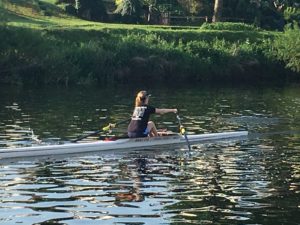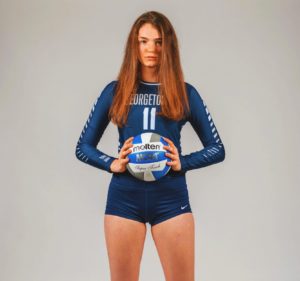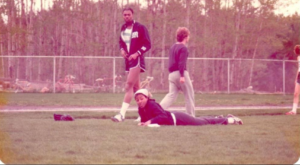Martha Waterstone, aged 19, is currently captaining the Senior Women’s Rowing Squad at the University of Warwick, England.
Having rowed for Wales at the Home International Regatta in 2019, below Martha shares her past experiences in the competitive sporting world and her ever-changing relationship with sport.
Although many would think that her performance at the International Home Regatta would be the main point of interest in this interview, it is actually Martha’s journey to get there that piques my interest. It is uncommon to find any athlete that’s had a completely straight forward journey to where they are today, and Martha’s story is one that demonstrates an incredible amount of sheer perseverance and determination in the face of adversity. I hope that with this interview, I am able to translate Martha’s insight into competitive sport and normalise how an athlete’s relationship with sport may not always be plain sailing, but that is what makes each individual athlete who they are today.
The first thing that I’d love to ask is how you got into rowing, and if there was a specific moment where you realised that this was something you wanted to pursue to a higher level than just recreationally?
I began rowing in year 8, at 12 years old when my secondary school’s rowing coach came around in our sports lessons offering the chance to sign up for some taster sessions. Rather than suddenly realising an undying passion for rowing, it was more something of a ‘why not’ moment – why shouldn’t I give it a go. I remember in the first few sessions quickly becoming extremely competitive about how many 500m laps we each could complete up and down the river and the obsession has spiraled from there.
When you were 16, you stepped away from rowing for a period of time after suffering from feeling as though you had burned out. I was wondering if you could tell me what you think led you to feel that way and if, with hindsight, there’s anything that you would have done differently to avoid that happening.
Yes, I ended up stepping away from competitive rowing for about half a year and mainly just rowed by myself in a single scull a couple times a week. Being able to row without the competitive aspect gave me an opportunity to fall in love with the sport again, and I think this was the main reason I felt burnt out; I had stopped loving rowing.
I imagine this is a feeling many junior rowers and athletes can relate to. It is a very intense sport and involves a lot of training sessions every week which can be quite overwhelming, especially alongside balancing education, exams and other coming of age experiences. I don’t feel this is something I could have avoided but with hindsight, I was just really lucky my school offered a non-competitive programme at that point.
Returning to sport after time away can often be a demoralising experience as your teammates appear to have improved and you are left to play catch up. What fueled your return to rowing and how did you cope with the transition back into a competitive environment where you initially may not have been the strongest in the squad?
I returned to rowing at the start of my final year at school, having taken some time off. This meant that I was rowing alongside peers who had experienced great successes in their summer season that I hadn’t experienced. If I’m honest, I was really jealous. But I think it turned out to be more than just jealousy – I was extremely frustrated at myself for having given up on the previous season.
Looking back now, I realise that my perspective here was completely wrong and actually, having issues with injury and then a stumble in confidence isn’t giving up – they were just singular moments that happened in my journey that were reflective of my mental state at the time. But regardless what they were or where they came from, those feelings of jealousy and frustration really lit a fire beneath me. I was determined to have the most successful year I possibly could and looking back on it now, I’m extremely proud of what I achieved.
Trialling for any national rowing team can be a grueling process as you attend frequent trials and tests to assess your rowing. During this time, how did you manage to keep yourself going and not let yourself be defined by the constant tests of your ability?
Throughout the year, I built incredibly close relationships with the people surrounding me, both with my coaches and teammates alike. We built such close relationships that eventually I felt like we were all rowing for one another just as much as we were rowing for ourselves. In particular, I had two teammates called Katie Kearsey and Arwen Van der Horst, who inspired (and still do inspire) me greatly. Throughout races I would often focus on doing well, not just for me, but also for them. So on the whole it was definitely the team around who pushed me through the trialling process.
Rowing is a relatively unique sport in which you are often straddling competing as an individual and as a team simultaneously, often having to compete against your fellow teammates to secure a place in the boat. Were there times that your relationships with your teammates felt strained as a result of the pressure that you were under? How do you find a balance between maintaining friendships and pursuing your own goals?
I’ve reached a point now at university where I feel much less competitive towards my teammates than I have in the past. For the most part, I care about the development of the squad as a whole rather than just my own development, however, it would be fair to say it’s taken an extremely strained competitive relationship to get me to this point.
My previous relationship with competitiveness came to a climax when I was in Year 13, when I was one of five girls all competing against each other for four places in a boat. This competitive environment reached a rather messy peak with the involvement of parents, outside parties and a whole lot of tears. I think experiencing the breakdown of relationships as a result of competitive environments has made me wary of the dark side of competition. However, you can also argue that healthy competition is one of the greatest motivators there is and in the correct amounts, it can push a squad forward infinitely more than it can hold one back.
During your trialling period you unfortunately developed tendonitis in your wrist, resulting in you taking a month off of rowing. Having decided so certainly that trialling was what you wanted to do; how did you cope with suddenly not being able to compete in the way you wanted?
Whilst on our Easter training camp, where we were learning to sweep alongside improving our sculling, a niggle in my wrist became a ping pong ball shaped swelling. This injury eventually led to a month’s break from rowing to recover. I was given the opportunity to come back after my rest and trial by myself rather than in a crew boat, which I fully intended to do, however the week before the trials I fully lost my nerve and pulled out.
I think looking back now, I am able to realise that I was not in the best mental state and lots of what happened in relation to my rowing career was as a result of this. I had a rather mild form of tendonitis and likely could have returned to rowing sooner than I did. I definitely would have been able to put it in a decent enough shift at Welsh trials, but I really did just lose my nerve.
Up until this point, I had somehow survived about 4 years of rowing with no kind of injury at all and the few weeks I lost from my wrist injury left me feeling as if I were completely on the back foot and unable to catch up. With the knowledge I have now I am well aware that a couple weeks off rowing is not the end of the world, but at the time it just knocked me off kilter.
Now that you are at university, you’ve taken on the role of Captain of the Senior Women’s Squad. Is there anything from your own past relationship with rowing that directly affects how you are captaining the Squad today?
One of the main things which I try to remember is that one bad session or race isn’t the end of the world. I’m very fond of making graphs and tracking progress, and even more fond of seeing that progress being positive for the squad. However, I know more than anything else at the end of the year the few bad sessions and occasional bad races won’t matter as much as what was learnt from them.
How did you learn how to view your relationship with sport with perspective, ultimately allowing you to realise that one bad race doesn’t matter? Is there any advice you would give to others that are struggling to come to that realisation?
I think mostly it took a series of blunders and embarrassing incidents to realise at times it’s better to move on. For example, I have previously crashed into the safety boat mid race. The embarrassment from the crash absolutely haunted me and whilst the easiest response from that incident would be to try and forget everything about the race, with perspective, I was able to remember that race as a lesson on how to steer.
Moving on from embarrassing mishaps is one thing, but moving on from poor sporting performances is much harder. Feeling disappointed with yourself is something every athlete experiences and very often I think that fear of a poor performance is what motivates me most to push through the pain. Realistically, I wouldn’t say I’m in a position to give advice on how to deal with disappointment, but instead, I can advise whoever’s reading this to try to learn from it and move on.
What I’ve taken from this interview.
Speaking with Martha, it is clear that although her relationship with sport has been tumultuous, she has managed to take each moment as a chance for growth, even issues that may not seem initially positive, such as injury or burn-out. For me, this interview has made me cognizant of how I view failure in the pursuit of success, forcing me to contemplate why I am competitive; for love of the sport or for fear of failure?
Written by Aoife Parr.





